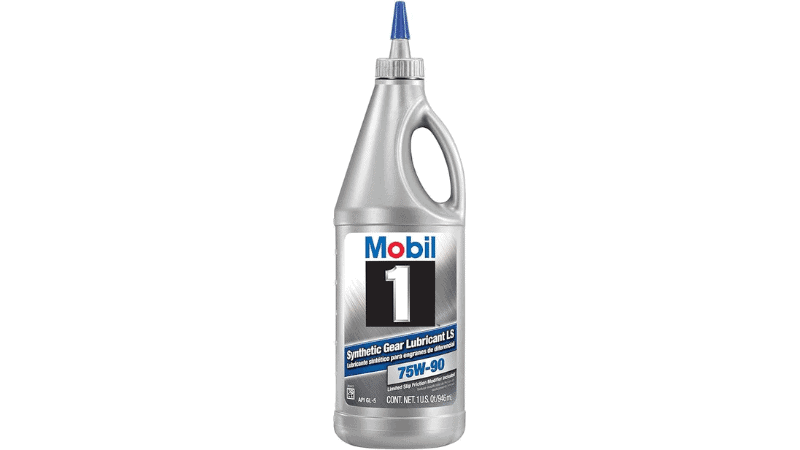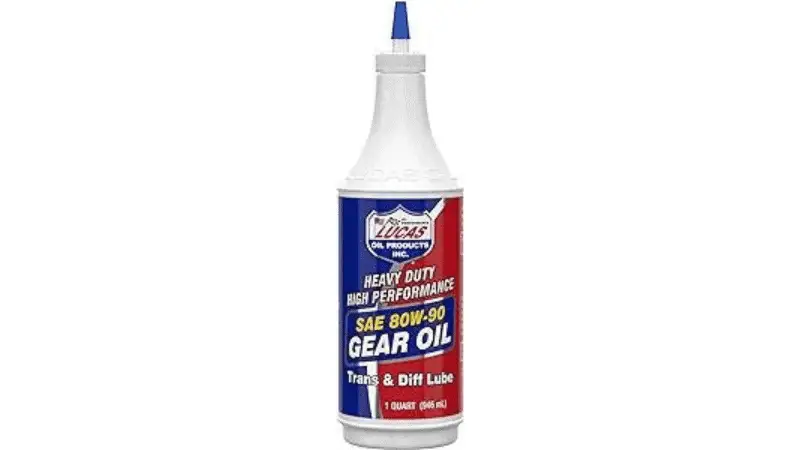From many types of different gear oils, it can be tough to decide which great oil is better for your car. We will compare 75w90 vs. 80w90 gear oil for you to make the best decision.
Knowing the difference between 75w90 and 80w90 is essential because they are not interchangeable. Basically, gear oil is suitable to use in industrial applications like gears, transmissions, and differentials.
Although both gear oils have similar additives, they contain different viscosities. And these viscosities affect their operating temperature. However, here below, we have discussed this topic in detail. To know, please stay with us.

What Is The Difference Between Differential Oil & Gear Oil?
Differential oil and gear oil are pretty similar but aren’t the same. The work of gear oil is to lubricate the car’s transmission. Likewise, differential oil comes to lubricate the vehicle’s rear diff (usually, as most cars are RWD It will also apply to the front diff in other cases).
Although you can technically use gear oil in your differential and vice versa, it’s not suggested. Differential oil is thinner, and it can’t give protection like gear oil.
Additionally, using the wrong gear oil in your differential or transmission can damage your vehicle’s gaskets and seals. Generally, it’s best to use an oil type specially designed for the job.
For your transmission applications, it’s best to use gear oil. Using differential greases and lubricants is best for your differential tools and applications.
75w90 Vs 80w90: Specifications
To the naked eye, you might think both gear oils are similar. Indeed, there are actually differences between 75w90 synthetic gear oils vs. 80w90. SAE numbers or grades are assigned to evaluate oils. For gear oil, the number should be 60 or higher. This means that both 75W-90 and 80W-90 are gear oils. Here below, we will give the specifications of both gear oils:
| Parameter | 75w90 | 80w90 |
| Density | 0.86 | 0.90 |
| Kinematic viscosity at 100 ºC | 19.2 | 15 |
| Kinematic viscosity at 40 ºC | 110 | 139 |
| Viscosity | 115 | 105 |
| Pour Point °C | -45 | -30 |
| Oil Type | Semi or fully synthetic | Multi-grade Mineral |
| Flush Point | 210 | 202 |
| Used In | Manual transmissions, limited-slip differentials, heavy duty applications like truck axles, and more. | Light commercials, trucks, four-wheel drives, construction, and agricultural equipment. |
| SAE Grade | 75w90 | 80w90 |
So far, we have discussed the specifications of only two. But before we jump straight into the differences between 75w90 and 80w90, we need to know their basics first. Tell us what exactly is meant by 75w90 and 80w90, why we use them, and where to use them.
75w90 Gear Oil

You can use this versatile gear oil in a broad range of applications. Notably, it can handle moderate loads and temperatures. And that features best for your light-duty trucks and passenger cars.
Moreover, you can use this 75w90 gear oil in heavy automobiles like SUBs and trucks. But you can’t use this oil in high-performance applications. So, without any problem, you can use 75w90 gear oil in various cars.
Related: 75w85 vs. 75w90 Gear oil: Which Is Better And Why?
80w90 Gear Oil

80w90 is a high-performance gear oil formulated for use in cars that undergo enough wear and tear. Besides this, it can tolerate heavy loads and high temperatures. And these fantastic features make it ideal for high-performance and race cars.
Additionally, you can use this gear oil in SUVs and trucks that do lots of off-road driving. Choose this 80w90 gear oil for your car to get the best performance.

80w90 vs. 75w90: What’re The Differences
Gear oils can be difficult to distinguish because they are all liquids, but there are significant differences between them. Gear oils are classified by SAE number and grade.
The use of 80w90 and 75w90 gear oils varies remarkably in terms of their materials used and other factors not visible.
Viscosity
Firstly, you should note that 80w90 is thicker than 75w90. That means 80w90 gear oil can offer extra protection for gears. But it can also create your vehicle’s engine harder. 80w90 gear oil is mainly used in high-performance applications. In contrast, you can use this 75w90 gear oil in many applications.
Thick lubricants are, after all, defensive. Gear oil can maintain sensitive axle equipment in excessively tough environments.
SAE 80W-90 is based on mineral oil, which means more frequent oil combinations. This means it requires more maintenance time. Mineral oils condensation at low temperatures can significantly affect their production.
SAE 75W-90 maintains a wide range of temperatures with constant thickness or viscosity. In cold environments, it is thicker than 80W-90 when it is in harsh heat and thinner.
Price
75W-90 has actual thickness or viscosity over a broad temperature spectrum. At temperatures above 80W-90, it thickens and thins when exposed to extreme heat.
75w90s are relatively more expensive than 80w90s. Since 75w90 is an overall balanced gear oil, it is more costly than the other. But if we look on the bright side, paying extra for 75w90 will be worth it. So both gear oils get an 8/10 rating.
So based on the criteria above, we have created a detailed breakdown of 75w90 synthetic gear oil vs. 80w90. But we have only focused on the main aspects. We hope you can now understand the difference.
Protection
The other essential difference is protection. Basically, 80w90 oil provides extra protection against wear and tear.
However, 80w90 gear oil can make your engine run harder, so you can only use this oil in some applications. On the contrary, 75w90 gear oil is more versatile and suitable for a broader range of applications. But it doesn’t offer as much safety against wear.
Density
Density is related to thickness. That is, oil that has a higher concentration is thicker. If we compare both lubricants, the 75w90 oil density is 0.86, and the density of 80w90 is 90.
Thicker gear oil has an additional advantage. They will protect the ears better than thin ones. When discussing lower temperatures, thicker oils can go rancid and lose effectiveness.
75w90 thinner gear oils can work perfectly. They are thin, and they can provide enough gear protection. Hence, they are suitable for operating and maintaining efficiency in extreme conditions. That being said, for density, 75w90 gets a 9/10, and 80w90 gets an 8/10 rating.
Operating Temperature
75W-90 is thermally stable, Para-synthetic, shear stable, and thermally strong. It’s a multi-grade gear lubricant recommended for use in all types of car drive applications.
Gear oils must operate under a wide ambient temperature range. Mainly, this gear oil is increased with thermal and oxidative resilience to tolerate high temperatures of 300F to 350F.
80w90 contains a higher operating temperature than 75w90. That means 80w90 gear oil can tolerate heat and stress. And it’s making it ideal for use on high-performance surfaces. Yet, 80w90 gear oil can overstress your engine, so it’s recommended for only some applications.
75W90 Vs. 80W90: Which Is Better?
Both 75w90 and 80w90 are SAE viscosity grades. You can divide transmission oil into single-stage and multi-stage viscosity for all weather types. Similarly, you can divide single-stage viscosity types into high and low-temperature types.
Therefore, 75w90 and 80w90 are multi-grade viscosities suitable for all weather types. The main difference between these two great oils is their low-temperature viscosity.
Consequently, W means low-temperature type and is suitable for winter use. Generally, in front of W number means low-temperature viscosity; the smaller the number, the higher the density, and the better the low-temperature performance.
The number behind the W means high-temperature viscosity. The bigger the number, the higher the thickness, and it provides better high-temperature performance.
In other words, 75w90 and 80w90 contain similar high-temperature performance. Thus, 75w90 has lower low-temperature viscosity, better fluidity, and more robust low-temperature performance.
Accordingly, 75W applicable temperature can be up to minus 45°and 80W isn’t less than minus 35°. Obviously, 75w90 is better than 80w90 and more appropriate for areas with harsher winters, and lower temperatures.
75w90 Gear Oil Equivalent:
Depending on your machine requirements, you can use gear oils. Still, depending on what gear you are going to lube in, you can use an equivalent of 75w90 gear oils. For hypoid vehicles, you can use 80w90 and 85w90 as long as it’s API GL-5. In fact, 75w-85 gear oil also can be used as an equivalent.
FAQ (Frequently Asked Questions):
Q. What is 75w90 gear oil used for?
75W-90 is a synthetic gear lubricant designed from synthetic base oil and an advanced additive system. Nonetheless, you can use this oil in many railway gearboxes. Even so, it gives excellent load-carrying capacity where extreme stress and shock loading are expected.
Q. What is 80w90 gear oil used for?
Gear Oil SAE 80W90 is a high-pressure gear oil. Subsequently, you can use this oil wherever high levels of pressure occur. For example, there are planetary gears, final drive gears, construction tools, agriculture, and industry.
Q. Can I use 80w90 instead of 75w80?
Yes, it is excellent to use 75w90 instead of 80w90 gear oil. Although 80w90 gear oil is best for your vehicle, you can use 75w90 oil without any problems or loss of performance.
Q. What does 80w90 stand for?
The initial value of “W” (W=winter suitability) indicates the oil’s flowability at cold temperatures. Transmission oil with 80W flows down to -26°C. You are well prepared for the Central European winter. The number “90” also indicates the gear oil’s kinematic viscosity at 100 degrees Celsius.
Q. Can you mix 75w90 and 80w90?
You may think I can mix 75w90 and 80w90 oils; the answer is yes. Typically, it depends on what your aim is and what kind of car you have.
Adversely, if you don’t want to drain all the old oil first, mixing these two oils won’t hurt. The oil’s viscosity will be between two grades, which is okay. Ergo, you can lubricate your car’s engine properly.
Final Word
To conclude, 80w90 gear oil is best for high-performance applications, while 75w90 is best for more versatile use. Hence, 80w90 gear oil is thicker than 75w90, offering more protection for your gears.
Remember that 80w90 gear oil can make your engine run harder. If you want the oil best for high-performance applications, 80w90 gear oil can be the best. But, if you want to use oil for various applications, 75w90 gear oil will be a better choice.
Overall, the article discusses complete information about 75w90 vs. 80w90 gear oil. This article will be helpful for you. Thanks for reading this article.
Related Posts
